Australia has been accused of bribing human traffickers, paying off the Cambodian government to take in refugees and spying on East Timorese officials. With geopolitical tensions at boiling point, Australia’s actions could have damaging repercussions for its relationship with Southeast Asia
On December 11, 1989, on a small aircraft flying low over the Timor Sea, a bottle of champagne was uncorked. Gareth Evans, then Australia’s foreign minister, and his Indonesian counterpart, Ali Alatas, sipped the sparkling wine before posing for the cameras, grinning and laughing. There was reason to celebrate. The two countries had just negotiated the Timor Gap Treaty, a deal that secured lucrative oil fields for Australia in the Timor Sea. However, according to the UN Convention on the Law of Sea, no parts of those oil- and gas-rich waters fell under Australian jurisdiction.
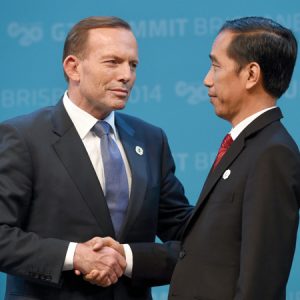
In fact, they belonged to what is now independent Timor-Leste, which, at the time, was a province of Indonesia after being invaded and occupied 14 years earlier.
As Indonesia handed over Timor-Leste’s natural resources, Australia conveniently overlooked Indonesia’s brutal occupation. It is estimated that almost a third of the East Timorese population died from execution, starvation or disease during Indonesia’s 24-year rule.
The East Timorese NGO La’o Hamutuk has stated that, since 1999, Australia has earned $4 billion from just one oil field that “should rightfully belong to Timor-Leste”.
Twenty-five years after this sordid deal was done, another bottle of champagne was opened. This time the wine was sipped by Scott Morrison, Australia’s immigration minister at the time, and Cambodia’s interior minister, Sar Kheng. The toast, however, was not to celebrate the transfer of oil rights, but of people.
Last September, the two politicians put pen to paper on a highly controversial deal that will see refugees currently held in Nauru – home to one of Australia’s notorious immigration detention centres – relocated to Cambodia. In return, Australia will pay the impoverished Southeast Asian nation $35m over a four-year period.
Australia has also come under criticism over the past two years over claims it spied on East Timorese officials and legal advisors, bugged the country’s cabinet room in 2006 and stole secret documents relating to oil and gas disputes in the Timor Sea.
Less than 100km from one another at their closest points, Australia has a long and complex history in Southeast Asia. At times this history has been destructive; on other occasions it has been positive.
“Australia has good reason to be proud of some things it has done in Southeast Asia,” said Richard Tanter, a professor at the School of Political and Social Studies at the University of Melbourne.
Examples include its support for the Indonesian Republic in the 1940s; its leadership of the International Force for East Timor, a non-UN peacekeeping task force set up in 1999 to address the humanitarian crisis in Timor-Leste; and its assistance in helping to establishing the UN peacekeeping force in Cambodia in the early 1990s.
But as the so-called ‘Asian century’ progresses, some commentators have questioned what role Australia will play. After a spate of controversies in recent months, not all have come to optimistic conclusions.
“Australia has, for a long time, spoken about being an important part of the Asian century and forging closer ties with Southeast Asia,” said Hong Lim, a former Cambodian refugee who is now an opposition MP in the state of Victoria. “But this work is now being destroyed. It’s like we’re behaving as a colonial power.”
In an interview with Time magazine last year in the aftermath of the Cambodian refugee deal, Lim stated: “Scott Morrison has earned himself the title of the most notorious human trafficker of the year.”
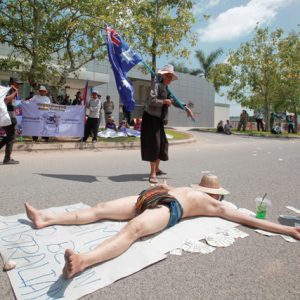
One year on, Lim told Southeast Asia Globe that not only does he stand by that assessment, he believes that Australia “has taken that shameful title”.
This time he was referring to the controversy over Australian border officials who allegedly paid human traffickers $31,000 to take a boat laden with 65 asylum seekers back to Indonesia in May.
Officials in Canberra did not officially deny the allegation. In fact, the Australian prime minister, Tony Abbott, stoked tensions when he flippantly told reporters that his country’s border officials are “incredibly creative” in their actions on immigration issues.
This came on the back of increased tensions after Indonesian officials executed a number of prisoners convicted of drug smuggling in April, including two Australian nationals. Canberra’s calls for clemency were rebuffed, leading Australia to recall its ambassador from Indonesia. The latter responded by describing the former as arrogant for trying to dictate its sovereignty.
Earlier this year, the Australian government announced its intention to significantly cut foreign aid. The reduction would equate to $8.4 billion over the next three years. It is estimated that Indonesia, Vietnam, Myanmar, the Philippines and Laos will lose almost 40% of the aid they receive.
“When I came to Australia from Cambodia more than 40 years ago, the country was very embracing and generous,” said Lim. “Now we see this very mean-spiritedness from it. Look at the cuts in aid – they’re outrageous. Australia should hang its head in shame.”
Joshua Kurlantzick, senior fellow for Southeast Asia at the Council of Foreign Relations, recently wrote that, as well as implications for Australia’s ‘hard power’ dealings with Southeast Asia, the country’s ‘soft power’ in the region will be diminished by the foreign aid cuts.
Furthermore, according to Tanter, Australia’s relations with Indonesia are almost at an all-time low. “Except for when Australia sent peacekeepers into Timor-Leste in 1999, the countries’ relations are worse now than they have been at any time in the past three decades,” he said.
This deteriorating relationship is especially concerning for Australia due to the geopolitical importance it places on Indonesia. A 2012 white paper commissioned by the previous government, titled Australia in the Asian Century, identified Indonesia as one of five Asian nations – the only one in Southeast Asia – that are of ‘priority’ for Australia’s regional policy in the 21st Century.
Numerous commentators told Southeast Asia Globe that the recent spates of controversy were, to a large extent, a result of Australia’s domestic political situation – namely the conservative Liberal government.
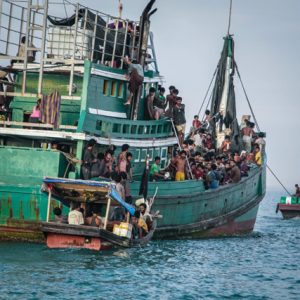
“This is a very bad time in Australian politics, and relations with Indonesia are hostage to particularly negative domestic political dynamics in Australia,” said Tanter.
Damien Kingsbury, personal chair at the School of International and Political Studies at Deakin University, Melbourne, was equally critical of the Abbott government. Of the cut in foreign aid, he said the decision was “politically acceptable at home, given the budget shortfall and the government’s less-than-subtle appeal to xenophobia, but unhelpful in terms of genuinely addressing the myriad problems of the countries that Australia assists”.
Kingsbury, who has spent decades researching and commenting on Timor-Leste, did point out that Australia’s dealings with the country are nothing new. “Australia is a regional bully,” he said. “But that is neither new nor surprising. Should its position be changed? Of course – if it was to follow a moral course. Will it? Unlikely,” he said.
If the disputes with Indonesia, the worrying deals over refugees and the significant cuts in aid were indeed due to domestic policy decisions by the current Australian government, rather than long-term foreign policy goals, then it could be hoped the poor relations are temporary.
In fact, according to Kingsbury, relations between Australia and Indonesia are bound to improve, as long as there “are no further dramas”.
Even if Abbott’s backslapping visit to Singapore in June signalled that Australia does retain some allies in Southeast Asia, its difficult relationships with other regional nations are far more complex than a few recent diplomatic spats and controversial deals.
“In truth, the Australia-Asean relationship is a mismatch, a result of geography,” Sally Percival Wood, lecturer at the Centre for Citizenship and Globalisation at Deakin University, wrote on the Conversation website last year.
In 1974, Australia became Asean’s first ‘dialogue partner’. Since then it has also joined several of the regional bloc’s bodies, and economic ties between the country and the region are substantial, accounting for 14.8% of Australia’s total trade in 2013, according to the World Bank.
However, as Wood wrote, Australia’s relations with Southeast Asia have been hampered by its “focus on extra-regional alliances – principally with the US. This leads Australia to project an image of a nation that would rather be somewhere else, a nation that commits to regional processes on a provisional basis.”
But if Australia wants to change its image as a lackey of the US, it might be difficult. As a May article in Foreign Affairs makes clear: “For Washington, the US-Australian partnership has become a special relationship with few equivalents in the world. But few outside a small circle of policy elites seem to have noticed”.
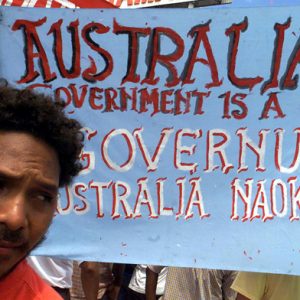
Indeed, in 2011 Barack Obama chose to officially announce his country’s political, economic and militaristic refocus on the Asia-Pacific region – the famed ‘pivot to Asia’ – inside the Australian parliament.
Australia’s importance to US geopolitics was laid bare in
a report titled Gateway to the Indo-Pacific: Australian Defence Strategy and the Future of the Australia-US Alliance, published in November 2013 by the Centre for Strategic and Budgetary Assessments, a US-based think tank that receives funding from the US Department of Defence.
“Australia represents something of a geographic ‘sweet spot’ in the search for potential operating locations outside the reach of China’s missile forces,” it reads. “As the world’s centre of gravity shifts from west to east… Australia has moved from ‘down under’ to ‘top centre’ in terms of geopolitical import.”
According to Tom Switzer, research associate at the United States Studies Centre at the University of Sydney and editor of the online political journal American Review, this puts Australia in a difficult position.
“Some leading defence and political figures are… nervous about upsetting the sensitivities of our largest trade partner [China]. It is akin to riding two horses simultaneously – a tricky and potentially dangerous diplomatic feat,” he said.
What this means for Southeast Asia is uncertain. There is little doubt that, in the short term, Australia’s alliance with the US is certain to curry favour with the Southeast Asian nations that oppose Chinese claims in the South China Sea, such as Vietnam, the Philippines and Brunei.
As the US has upped the rhetorical ante in recent months against China’s actions in the disputed area, Australia has also hardened its stance. Speaking at the Shangri-La dialogue in Singapore in June, Australia’s defence minister Kevin Andrews said that while his country “takes no side in the territorial disputes, we certainly deplore any unilateral alteration of the status quo”. This was widely seen as a veiled threat to further controversial moves by Beijing in the South China Sea.
However, according to Tanter, if Australia is to play a key role in the Asian century and foster better relations with Southeast Asia, it should first “adjust to the fact that China’s 200-year-long period of weakness is finishing”.
“Australia’s best option is to move to a more autonomous position, with stronger relations of mutual interest with its nearest neighbours [Southeast Asia], and a balanced relationship with all its major trading partners,” he said.
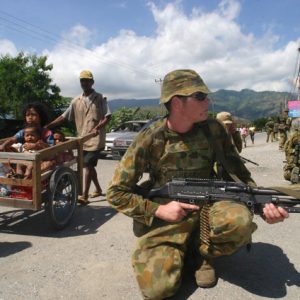
He added that, at the moment, such a goal is a long way off and the first step would be improving current relations with Southeast Asian nations and fostering an image as a helpful neighbour.
Furthermore, as Wood wrote on the Conversation, Australia should also temper its inflated self-image as a senior partner in its relationship with Southeast Asia. As the region expands economically and politically, and considering projections by IHS Global Insight that Indonesia’s economy could surpass Australia’s by 2028, the southern neighbour could even be sidelined.
“The fundamental fact, still not learned in Canberra, is that Australia needs Indonesian cooperation far more than the other way around,” said Tanter.
It is not only Indonesia’s economic power that is significant, he added, it is also critical for “current Australian anxieties such as unauthorised population movements, counter-terrorism efforts and illicit narcotics imports”.
The relationship with Indonesia might also serve as a template for relations with other Southeast Asian nations which, in the words of Lim, might include not “behaving as a colonial power”.
“The challenges now [for Australia] are about managing priorities in a region that is rapidly transforming in terms of balance of power, balances of interest and balances of trade,” Wood wrote. “Without Australia, Asean would lose very little. But without Asean, Australia could lose a great deal.”
Keep reading:
“The West didn’t just turn a blind eye to Indonesian atrocities – it provided support” – Clinton Fernandes of the University of New South Wales has unearthed previously classified documents that shed new light on the West’s support of Indonesia’s brutal occupation of Timor-Leste


